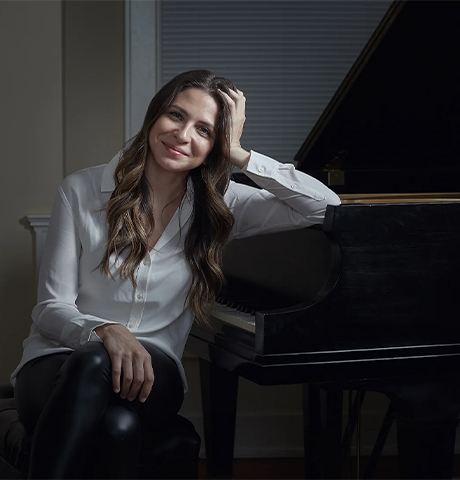FORREST PIERCE: something, shimmering
Though we strongly associate the knowing and experience of the body, the mind, and the heart with our identity, the taste of our unique inner experience is mostly hidden from fellow humans. I’ve come to think of art as a gate through which the big country of our interior life can enter into the shared spaces we inhabit with others. Nothing in here is transferable, but it may be translatable. For me, music is uniquely effective as a carrier of the emotional, numinous, imaginal, and kinesthetic knowing of our lives.
“something, shimmering” is an incantation for translating some experienced, inner wisdom to the listener through imagination, emotion, and physical being. It attempts some unusual things that are absolutely usual to this pianist or this composer, and sometimes both: it makes the tremor of a suspended hand and wrist audible, visible, and beautiful; it colors a Sufi zikr chant with the tang of tinnitus, and marks the passage of time with the clicking and popping of a leaking and damaged spine; it shakes and flutters with the heart’s exquisite longing for reunion, through microtonal inflection, stabbing thunder, and the immense breathing of a silent, unseen companion. Somewhere in an imagined prairie of cottonwood leaves, trembling, it could be that “something, shimmering” affirms the inherent multiplicity of human experience through the fundamental unity of human existence.
—Forrest Pierce
HANNA BENN: Where Was I?
This piece is a reflective journey through memories, meditating on the emergence and morphing of one’s own self-concept and self-confidence. The composer wrote the following poem as an inscription for the piece:
At the heart
In the center
There is a mind
A body
An instrument ofLOVE
Where Was I?
— HERE
MOLLY JOYCE: Affection
Affection is about holding grace for a disorder or disability rather than resenting it, and allowing those affections to move one in a progressive direction. Additionally, I tried to involve the feeling of trying to catch phantom movements within physical disability, and the push and pull of involuntary movement within one’s body, through the push and pull of the right and left hand interaction throughout.
—Molly Joyce
MATTHEW EVAN TAYLOR: pneuma
This piece emerges from Taylor’s breath-centered musical practice, a framework he calls “AfroPneumaism.” This practice is centered in Black liberation, accessibility, and radical rest. He writes, “pneuma is the seventh of my AfroPneumaism pieces. As such the central instruction is simple: stay silent and listen on the inhale; express, make noise on the exhale. The breath is loosely defined as ‘normal’: not a fast athletic breath nor the anticipatory inhale musicians often use, but neither is it meant to be the breathing found in mindfulness practice. All gestures are connected to the breath.”
ADELIIA FAIZULLINA: From the beginning to…
Writing music for Brianna Matzke has been an inspiring journey, and I’m grateful for the experience. Last summer, during my residency with Longleash Ensemble in Kentucky, I found solace in my long walks amidst the rural landscape, surrounded by the sonic vibrations of nature and thinking about my project for Brianna and her neurological tremor condition. I came to the sudden realization that everything around us tremors and vibrates in our world. I also couldn’t help but think of this in connection to string theory, a concept I had learned through astrophysics podcasts.
“From the beginning to…” reflects my fascination with string theory and its connection to music. The piece explores the idea of the world’s inception, represented in the piece by vibrations of the fundamental harmonic in the strings, and echoed in the piano. As the keys resonate and pulse, the composition invites contemplation of our collective journey and the uncertainty of the future. Brianna Matzke’s neurological tremor condition is seen as a source of inspiration for the composition, serving as an important reminder of the intrinsic link between the vibrational tremors of music and the vibrational nature of our existence."
—Adeliia Faizullina

